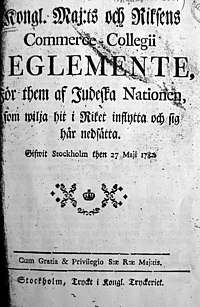Judereglementet
Judereglementet[1] was a 1782 Swedish statute containing regulations "for those of the Jewish Nation wishing to move to and settle in the Kingdom (of Sweden)" without having to convert to Lutheranism, as the law had stipulated hitherto.

It enabled Jews to settle and become naturalized Swedish citizens; as long as they were in possession of a fortune.
Earlier legislation banning Jews altogether was modified so as to only ban poor Jews.
The minimum capital stipulated was two thousand riksdaler that included clothes, effects, household inventory, running costs, ready cash AND bills of exchange.
Jews could not bring domestic servants with them, lest they smuggle beggar Jews (tiggare Judar) into the country.
Jews were restricted to three cities: Stockholm, Gothenburg and Norrköping, where they were permitted to build synagogues. However, Jews could only marry within their own faith, could not become Members of Parliament. and were not allowed to proselytize.
The statute also restricted the occupations Jews could pursue: membership of guilds was not open to them. Judereglementet specified the cutting of diamonds and other precious stones as permitted occupations, but trading in gold was restricted to the guilds.[2][3]
References
- Swedish text of Judereglementet
- judereglementet Förvaltningshistorisk ordbok
- Judarna i Sverige
Reading
- Hugo Valentin, Judarnas historia i Sverige. Stockholm 1924. ISBN 91-27-10790-6
- Hugo Valentin, Urkunder till judarnas historia i Sverige. Stockholm 1924. (Reglementet tryckt på s. 18ff.)